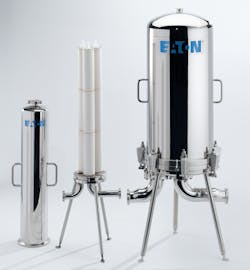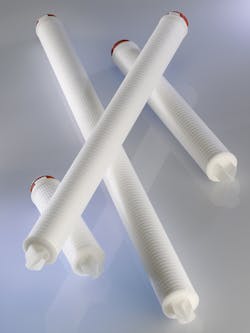Double filtration solution fits seamlessly into German brewing operation
Bringing craft brewing processes into harmony with the requirements of modern production poses challenges for many manufacturers. In the brewing industry, completely different process steps must be coordinated with one another. The filtration process is of particular importance to ensure that quality is retained between fermentation and bottling. In the German Ducal Bavarian Brewery of Tegernsee, the filtration process had to be customized for automation and increasing production volumes. It was a situation for cartridge housings and depth filter cartridges from Eaton.
Background: The ducal art of brewing in Tegernsee has been popular for centuries
Monks, dukes and kings have been a part of the Tegernsee brewery. Opinions differ as to whether the origins go back to 1050 or whether the brewery was "only" founded in 1675. Undoubtedly though, an abbot brought the brewing rights of Tegernsee a long time ago. Since then, the brewery has been located on the site of a former Benedictine monastery in Upper Bavaria, Germany. The private brewery is still in ducal hands.
Where a monk community once worked, there is now a school with an auditorium and a local museum, a restaurant — and the brewery. Their products are extremely popular: “Tegernseer Hell” beer is not only consumed in Upper Bavaria, but in all of Germany and in several other places around the world. The output is now several hundred thousand hectoliters.
Challenge: Only automation can meet the increasing demand
What the expert knows and even the layman can sense: In view of such large quantities, the art of brewing is dependent on automation — especially since the Ducal Bavarian Brewery of Tegernsee is one of the few German breweries that is recording steady growth. After new fermentation tanks were installed to expand the production capacity, a second line indicated growth in the bottling line as well.
As an elementary step in quality assurance and shelf-life of the beer, the additional second bottling line also had an impact on the filtration.
"There used to be a two-step filtration at Tegernsee," said Norbert Stühmer, master brewer and technical director of the ducal brewery. This filtration system reliably reduced the cloudiness and thus met the requirements for the perfect quality and purity of the beer.
"Its shortcoming, however, was that it stood in the way of striving for a higher degree of automation," said Frank Servay. As an application engineer in Eaton's Filtration Division, Servay knows the Tegernsee brewery well.
Eaton has been supporting the brewery for many years with high-quality filtration products such as filter sheets, filter cartridges and stabilizing agents.
When looking for a fully automated filtration solution, the focus was on chemical cleaning with alkaline agents and acids in the clean-in-place (CIP) process. CIP offers the advantage that system parts can be cleaned time and again and on-site without dismantling or removing the filter media. For this it was necessary to design an enclosed filtration system that is fully CIP capable (i.e., that can be cleaned and sterilized automatically). After all, measurement and control technology, quality control and integrated oxygen and turbidity measurement in the brewery not only leads to a high level of automation, but also guarantees consistently high-quality products that undoubtedly come out of a traditional ducal production facility.
As part of preliminary tests, the master brewer’s team tested various filtration concepts from different providers.
"Ultimately, we came to the conclusion that the filtration proposed by our established supplier, Eaton, also best suited the given requirements for our new challenge of a more automated bottling line," Stühmer said.
Solution: Fully automated trap filtration as the key to increasing production volumes
To ensure the quality and purity of the Tegernsee specialties, the solution included trap filtration with cartridge housings from the BECO INTEGRA CART KB range and BECO PROTECT PG depth filter cartridges, which are installed after the diatomaceous earth filtration step. Trap filtration ensures that diatomaceous earth particles are retained to produce a bright, clear beer.
The BECO PROTECT PG depth filter cartridges made of polypropylene (PP) are particularly suitable for beverage production, because the high-quality material offers high chemical, thermal and mechanical stability, even with regular cleaning in the CIP process. The finely graded PP fleece of the filter cartridges is wrapped from coarse to fine on the inner core and can absorb and retain a wide range of particles.
"This means that the filter material becomes tighter on the inside," Servay said. "This graduated wrapping forms a funnel and enhances the cleaning effect in the regeneration phase when the depth filter cartridges are flushed backwards. This ensures excellent cleaning results and a long service life."
The characteristics of all depth filter cartridges from the BECO PROTECT PG range match the respective areas of application: For beer filtration, they are available as particle filters with a retention rating of 3, 5, 10 or 20 µm and as fine filters with a retention rating of 0.3 or 0.5 µm.
The BECO INTEGRA CART KB cartridge housings in which the depth filter cartridges are installed are made of AISI 316L stainless steel. The design of the filtrate chamber and surface finish not only support efficient filtration, but also allow safe and quick cleaning — exactly in line with the requirements that the Tegernsee brewery has placed on the new, automated filtration unit.
Depending on the requirements, the cartridge housings are available in designs for 1 to 30 filter cartridges. In the Tegernsee brewery, two cartridge housings per filtration line, each with 30 depth filter cartridges of 30 inches each and a retention rating of 10 µm, ensure maximum flow rates with high efficiency.
Result: Double the output at same personnel costs
The new trap filters are used in a tandem system: Two cartridge housings operate in an enclosed system, one of them in standby mode. If a cartridge housing needs to be cleaned automatically — or in the case of scheduled maintenance — the system simply switches seamlessly from one housing to the other.
"If the yeast reduction needs to be increased, both housings can also be equipped and activated with depth filter cartridges with a finer retention rating of, for example, 0.5 µm,” Servay said.
The trap filters not only increase the service life of the filtration line, they also ensure high beer quality and more flexibility in the entire filtration process.
Thanks to the automation process in the brewery, both filtration lines can also be operated by the same staff who were previously responsible for only one filtration line.
"We were able to double our output in filtration with the same number of personnel deployed," said Stühmer.
With the integration of the filtration processes into the brewery's process control system, their automatic control and monitoring is also ensured, which further improves efficiency.
"After the expansion of the systems, the brewery not only has a second filtration line, but also a second new bottling line with 45,000 bottles per hour," Servay said. "This ensures that the bottling unit is always supplied with freshly filtered beer and that the downstream processes are not interrupted."
Best products for quality-conscious connoisseurs
The filtration solution from Eaton fits seamlessly into the automation concept of the brewing process at Tegernsee. In addition to the advantage in flexibility and fail-safe process management, the filtration system also helps to guarantee a product quality that measures up to the growing awareness of consumers for pure, high-quality beer.
"Our customers' taste for impeccable quality has improved," Stühmer said. "With the new filtration system from Eaton and the fully automated process, we can guarantee our patrons the impeccable quality that deserves the Tegernsee name."


